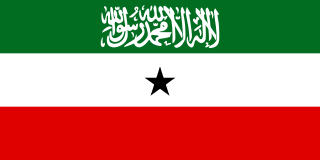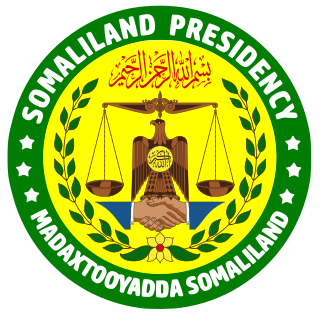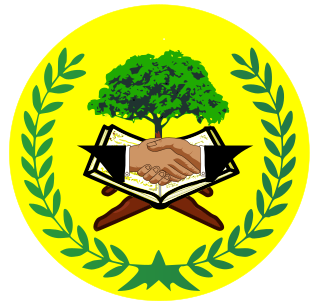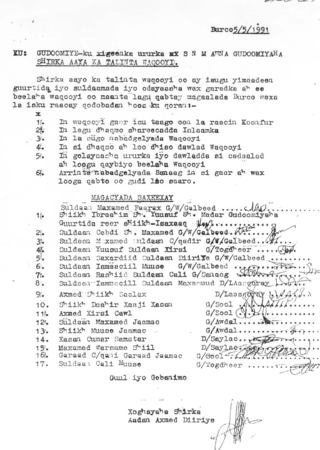
Somaliland, officially the Republic of Somaliland, is an unrecognised state in the Horn of Africa, recognised internationally as de jure part of Somalia. It is located in the southern coast of the Gulf of Aden and bordered by Djibouti to the northwest, Ethiopia to the south and west, and Somalia to the east. Its claimed territory has an area of 176,120 square kilometres (68,000 sq mi), with approximately 5.7 million residents as of 2021. The capital and largest city is Hargeisa. The government of Somaliland regards itself as the successor state to British Somaliland, which, as the briefly independent State of Somaliland, united from 1960 to 1991 with the Trust Territory of Somaliland to form the Somali Republic.

The president of Somaliland is the head of state and head of government of Somaliland. The president is also commander-in-chief of the Somaliland Armed Forces. The president represents the Government of Somaliland.

Dahir Riyale Kahin is a Somaliland politician who was President of Somaliland from 2002 to 2010. He previously served as a senior officer in the National Security Service in Somalia, and he was Vice President of Somaliland from 1997 to 2002.

Mohamed Haji Ibrahim Egal was a Somali politician who served as the President of Somaliland from 1993 to his death in 2002. He previously served as the prime minister of the State of Somaliland between 26 June and 1 July 1960 and as the first prime minister of the Somali Republic for eleven days in 1960 and again from 1967 to 1969.

The Isaaq (Somali: Reer Sheekh Isxaaq, is a major Somali clan. It is one of the largest Somali clans in the Horn of Africa, with a large and densely populated traditional territory.

The Somali Republic was the name given to the newly independent state of Somalia, following the unification of the Trust Territory of Somaliland and the State of Somaliland. A government was formed by Abdullahi Issa Mohamud and Muhammad Haji Ibrahim Egal and other members of the trusteeship and protectorate administrations, with Haji Bashir Ismail Yusuf as President of the Somali National Assembly and Aden Abdullah Osman Daar as President of the Somali Republic. On 22 July 1960, Daar appointed Abdirashid Ali Shermarke as Prime Minister. On 20 July 1961 and through a popular referendum, Somalia ratified a new constitution, which was first drafted in 1960. The new constitution was rejected by Somaliland.

The history of Somaliland, a country in the eastern Horn of Africa bordered by the Gulf of Aden, and the East African land mass, begins with human habitation tens of thousands of years ago. It includes the civilizations of Punt, the Ottomans, and colonial influences from Europe and the Middle East.

Edna Adan Ismail is a nurse midwife, activist, and was the first female Foreign Minister of Somaliland from 2003 to 2006. She previously served as Somaliland's Minister of Family Welfare and Social Development.

The House of Elders, also known as the Guurti, is the upper house of the Parliament of Somaliland. It has 82 members, representing traditional leaders. The House of Elders is mandated with considering bills proposed by the lower house of the parliament, the Somaliland House of Representatives.

Somaliland was a short-lived independent country in the territory of present-day unilaterally declared Republic of Somaliland, which claims to be its legal successor. It existed on the territory of former British Somaliland for five days between 26 June 1960 and 1 July 1960, when it merged with the formerly Italian administered Trust Territory of Somaliland to form the Somali Republic.

The Somali Youth League, initially known as the Somali Youth Club (SYC), was the first political party in Somalia.

Egal International Airport, is an airport in Hargeisa, the capital of Somaliland, named after Somaliland's second president Muhammad Haji Ibrahim Egal, the airport underwent major renovations in 2012–2013. In 2002 the airport handled 85,800 passengers & 4,300 tons of cargo on a total of 6,120 landings.

The following outline is provided as an overview and topical guide to Somaliland:

Independence Day is a national holiday observed annually in Somalia on July 1. The date celebrates the unification of the Trust Territory of Somaliland and the State of Somaliland into the Somali Republic on July 1, 1960. A government was subsequently formed by Abdullahi Issa, Muhammad Haji Ibrahim Egal, and other members of the trusteeship and protectorate governments with Aden Abdullah Osman Daar as president. On July 20, 1961, through a popular referendum, the people of Somalia ratified a new constitution.

Musa Bihi Abdi is a Somaliland politician and former military officer who has been President of Somaliland since December 2017. During the 1970s, he served as a pilot in the Somali Air Force under the Siad Barre administration. In 2010, Bihi was appointed the chairman of the ruling Kulmiye of Republic of Somaliland. In November 2015, Bihi was selected as the party's Presidential Candidate at the 5th annual central committee convention.
The following lists events that happened during 1960 in Somalia.

The 1969 Somali coup d'état was the bloodless takeover of Somalia's government on 21 October 1969 by military officers of the Supreme Revolutionary Council led by Siad Barre. Somali troops supported by tanks under the command of Barre stormed Mogadishu and seized key government buildings and ordered the resignation of the country's leaders. The coup deposed President Sheikh Mukhtar Mohamed Hussein and Prime Minister Mohammad Egal and led to the twenty-one year long military rule by Barre and the imposition of an authoritarian government in Somalia until 1991.

The Somaliland Declaration of Independence was made on 18 May 1991 by Somali sultans from the Isaaq, Dhulbahante, Issa, Gadabursi, Warsangali clans, as well as the Somali National Movement.

The Government of Somaliland (JSL) is the central government of Somaliland. The Government of Somaliland consists of legislative, executive, and judicial branches, each of which functions independently from the others. The Government runs under the framework established by the Constitution of Somaliland, adopted in 2001. It is a unitary state. The seat of the government is located in Hargeisa, the capital of Somaliland.

Presidential elections were held in Somaliland on 23 February 1997, the third indirect presidential election since the country declared its independence from Somalia in 1991. The elections took place towards the end of the Hargeisa Conference, held between October 1996 and February 1997. The election resulted in incumbent President Muhammad Haji Ibrahim Egal being reelected to a four-year term by a electoral college of elders who made up the national guurti(council of elders). Egal's closest competitor was Minister of Finance Suleiman Mohamoud Adan, who was also formerly in the cabinet of inaugural President Abdirahman Ahmed Ali Tuur.
















